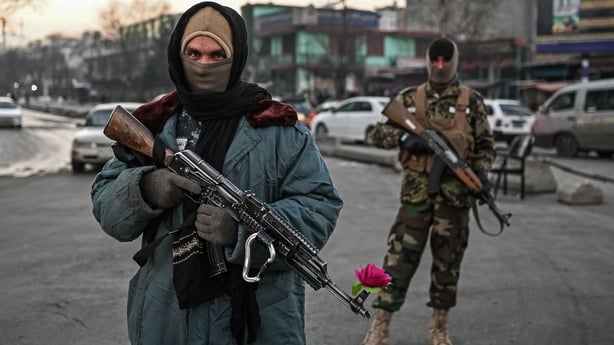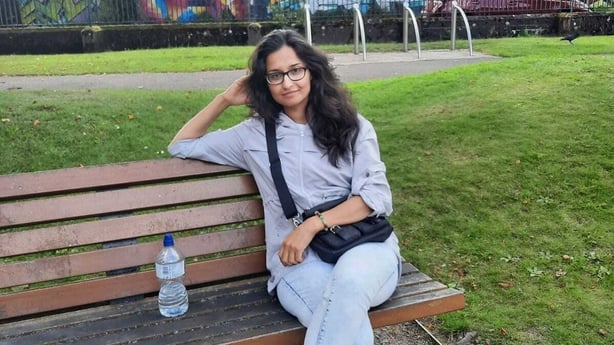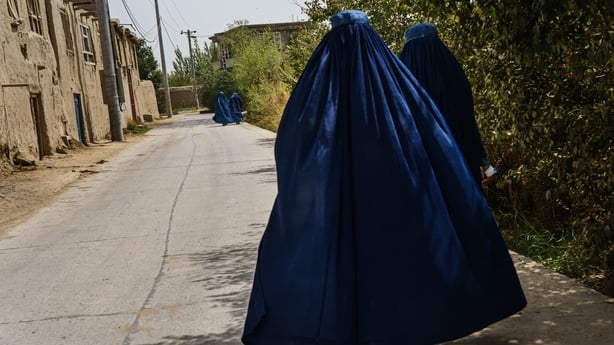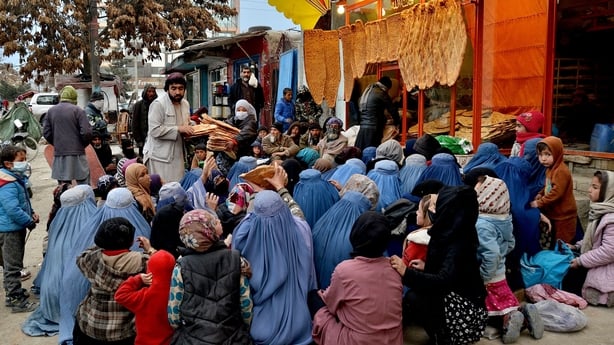A scheme allowing members of the Irish-Afghan community to apply for family members to join them here has been criticised as being "stressful", "cruel" and a "missed opportunity".
In September 2021, a month after Afghanistan fell to the Taliban, the Government promised an Afghan Admission Programme with up to 500 places.
The scheme opened on 16 December last year.
On Friday the deadline for applications was extended from this Thursday to 11 March after it was clarified that child siblings and the children of eligible adults were eligible to apply, despite there being no box on the form for them.
Last week, the Department of Justice published a workaround.
CEO of the Irish Refuge Council Nick Henderson said: "While the recent clarity on eligibility of minor siblings and minor children of vulnerable family members is welcome, this should have been clarified and provided for from the outset of the scheme."

Those supporting people making applications say many other challenges remain.
Under the scheme people can apply for up to four family members to join them, but there are a number of restrictions, including for example that adult siblings must be single.
Applicants must prove they can house and financially support the family members they are looking to bring to Ireland.
Unlike those brought here under the Irish Refugee Protection Programme, they will not have access to social welfare, housing supports or child benefit.
"We are assisting more than 70 people to apply to the programme directly and have referred others to our pro bono partners," Mr Henderson said.
"While we and our clients welcomed the programme, it has been extremely stressful for members of the Afghan-Irish community to meet its stringent requirements.
"Issues include providing certified copies of the required documents, securing offers of suitable accommodation for their family to be available at an unknown future date and prioritise only four family members based on their risk, aware that they are leaving others behind in danger," he said.
"The documentary requirements do not consider the situation of humanitarian crisis in Afghanistan, where families are in hiding, women cannot leave their houses without being chaperoned by a man, and the international postage system is not functioning," Mr Henderson added.
Reality of admission programme 'disappointing'
Managing Solicitor at the Immigrant Council, Catherine Cosgrave, said it has received hundreds of queries about the scheme, but "very few people have actually been able to meet all the requirements".
The CEO of Nasc, an organisation which works with migrants and refugees, agrees.
"The reality of the Afghan Admission Programme has been disappointing for so many of our service users," Fiona Finn said.
"There was huge anticipation that this would provide a pathway to safety for their families, but the strict requirements of the scheme have made it almost impossible for the majority to apply.
"It's frankly quite cruel to ask for so much from people. The documentary requirements alone are far more stringent than anything we've ever seen before. We've had people in tears in the office as we explain the requirements to them. Realistically we expect only about a quarter of the Afghans who we've been in touch with about this scheme to be in a position to actually submit an application."
"Even I went through hell to prepare all the documents, my hope level is very small . . . why, what did we do wrong? Why should it be that difficult?"
Another organisation which focuses on migrant and refugee rights, Doras in Limerick, is witnessing a similar situation unfold.
CEO John Lannon said: "We've been asked for assistance by over 120 people in the Afghan community who wanted to apply.
"Only around 30 of those meet the stringent criteria laid down in the scheme. The rest have had to come to terms with the fact that their loved ones are being left in very worrying and precarious situations in Afghanistan or elsewhere.
"There are problems getting certified documents, and even when someone has paperwork we don't know if it will be accepted. Another problem is the lack of supporting documents to demonstrate vulnerability. For example, how do people who have been verbally threatened by the Taliban or others prove that? How can someone convey the daily fear they might be living with on a form?" Mr Lannon added.
"Another huge problem is the financial requirements. Asking someone who is on a low wage, or not working, or is living in a Direct Provision centre or one room apartment, to provide a home for family members on arrival is unreasonable. The result is that many people who need to benefit from a programme like this cannot."
Soraya Ibrahimi spoke to RTÉ News on the day the scheme was first announced in September, and again in December as it opened.

Ms Ibrahimi, who has lived in Ireland for more than 14 years, wants to help her elderly parents, who both suffer from diabetes and her sister and her three young children.
She says all six are currently in hiding from the Taliban, where she said, "life is like jail".
With a limit of four people, she has already faced tough choices around who she would choose to help if she could.
However, the mother of three, who lives in a council house, said she encountered many other difficulties as she tried to put together her application.
"They want passports from them. My parents don't have passports and my sister's son lost his passport because every day, they're moving ... they can't stay in one place and it's very difficult for them," Ms Ibrahimi said.
"Another thing they want is a letter from my employer. I'm a single mum with three children and during the last two months (since the scheme opened) I tried to find a job for myself, but I said, if I find a job, who looks after my children?"

"Another thing they said, 'you must get a letter from your landlord or council' (stating that you have permission for your family to stay with you). I keep trying, they make an appointment with the council, I go there, I ask about that letter ... today they called me to say they can't give me that letter, it's not possible your family come stay with you for one year in that (council) house," she said.
"These are three things, important things I don't have."
Ms Ibrahimi says that she has now realised that she cannot apply, but when we spoke to her, she had not yet told her family in Afghanistan.
"I don't know how I can explain it for them. It's very hard, it's very difficult for me," she said, "I try my best but it's the end of the road for me."
'I don't want to lose them'
Elana*(not her real name) is submitting an application for four of her family members.
She says her family were targeted by the Taliban after it came to power in August.
"I don't want to lose them," she said, "now it's getting to the time to submit the application I am getting so stressed."
An Irish citizen who has lived here for more than 15 years, she tried to bring family from Afghanistan to Ireland in 2018 under a previous Humanitarian Admission Programme (IHAP).
She said the reason she was given for the refusal on that occasion was because she did not supply an Afghan birth certificate.
"But you accepted my identity when I came to Ireland without a birth cert, you gave me citizenship without a birth cert, you gave me a passport without a birth cert, you know who I am," she said.
She lives in rented accommodation and said that one of the most difficult elements of this application was proving she could provide accommodation for the family members.
"It's four people, if I am living in a rented house, my landlord wouldn't accept four people to live with me," she said.
Despite the financial burden she said she tried to rent a separate property for the four family members.
"I went to look for accommodation to rent, but I can't lie and say I'm renting it for myself and then bring someone else in. The person (landlord) was saying no, if someone is not in Ireland, no visa, I can't rent my accommodation to that person."

Then she said she had to ask friends for help.
"It was hard for me to ask ... there is a limit to how much you can ask of people," she said.
She also described the challenge of getting identity documents from Afghanistan to Ireland, to submit as part of the application.
"I was waiting for August, September, October, November, for four months I couldn't find someone to bring the documentation to Ireland, because there were no flights, there was no connection, no postage, nothing."
She described Afghan smugglers offering to charge her family €150 per document with no guarantee of their arrival, and people who were getting out of Afghanistan attempting to bring their documents with them only to searched and refused at the airport.
She believes that she has finally obtained all the documents she needs but remains anxious about the application.
"Even I went through hell to prepare all the documents, my hope level is very small," she said, "why, what did we do wrong? Why should it be that difficult?"
In a statement, the Department of Justice said that "the programme is similar to the previous humanitarian programme introduced for Syrian nationals, which also required sponsors to provide accommodation and other supports for their eligible family members".
It added that the programme was "complementary to other pre-existing immigration and family reunification avenues that enable Afghan nationals to enter the State.
"More than 750 Afghan nationals have already been granted permissions to reside in the State so far this year, which is a very strong and generous response by the Irish State to the situation in Afghanistan."







